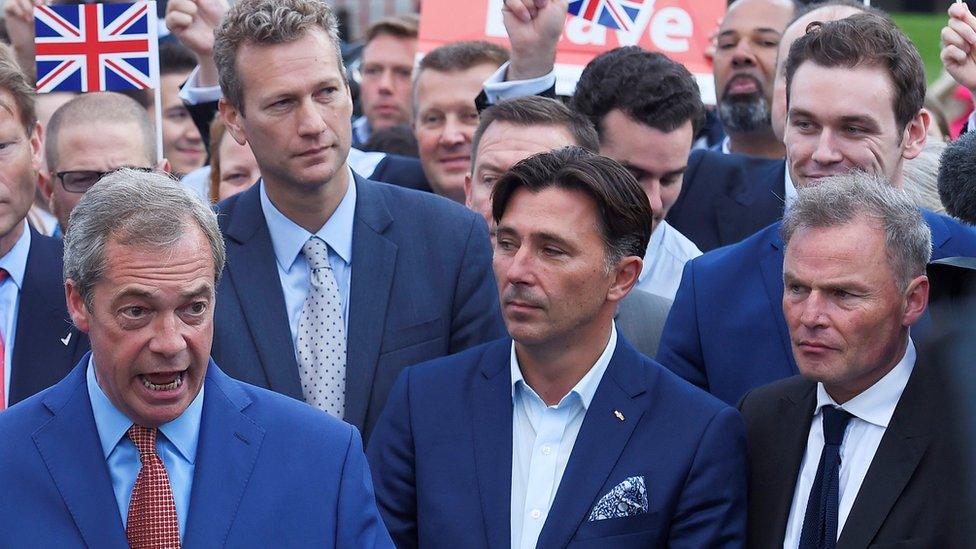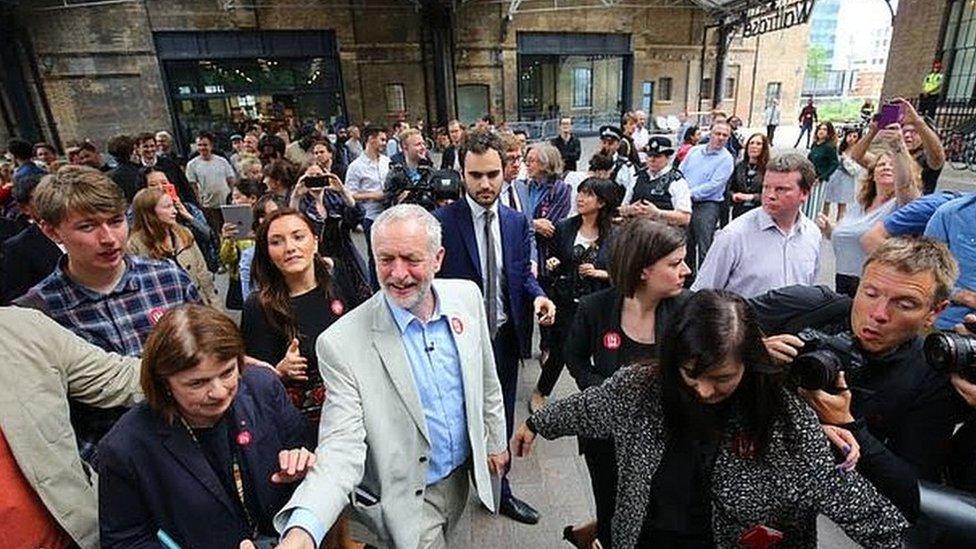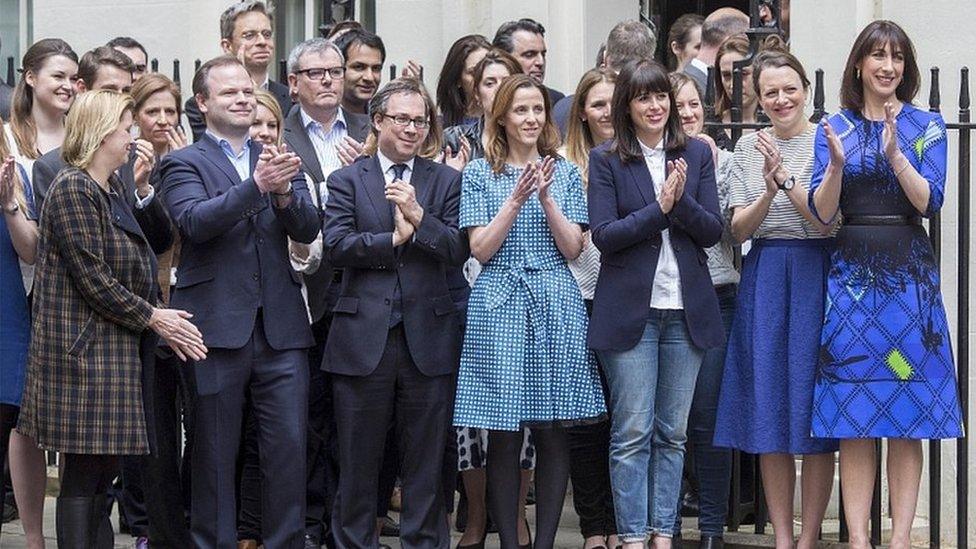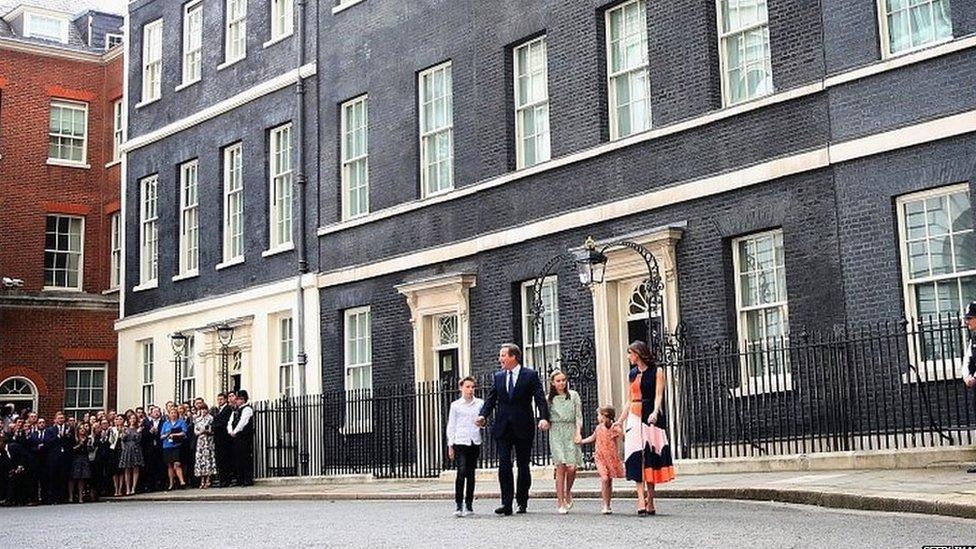What it's like to work for a political leader in your twenties?
- Published

Michael Heaver, top right, with Nigel Farage after the referendum
"I found the whole thing completely overwhelming when I first started."
Kate Shouesmith is admirably candid about what it was like to find herself working in Downing Street aged just 22.
Helping answer David Cameron's correspondence and organising receptions for MPs at Downing Street were among her day-to-day tasks when she first moved to No 10 from Conservative Central Office in late 2010.
While often the youngest person in the room, she was struck by the number of other 20-somethings among the circle of people working for the prime minister in the early days of his premiership.
"There was a core group of 25 to 35-year-olds," she says, many of whom, like her, had been inspired to get involved by the Tory leader's modernisation of the party and his success in the 2010 election.
While Westminster is often caricatured as a place out of touch with the lives of young people and indifferent to their concerns, there are quite a few people who have worked not just in the corridors of power but very close to the centre of power at a strikingly young age.
And they are not just career politicians like Mr Cameron, who famously worked as a special adviser to Chancellor Norman Lamont in his early 20s.
'Finger in the dam'
Matt Zarb-Cousin was plucked from relative obscurity at the age of 27 to become Jeremy Corbyn's spokesman in the Spring of 2016.
Before starting the job he was warned that nothing could prepare him for the challenge ahead, one of his colleagues likening it to "learning to ski jump".
The advice was sound. The party soon became embroiled in a virtual civil war, with half the shadow cabinet resigning in the space of a few days in protest at Jeremy Corbyn's performance during the Brexit referendum.

Labour was in turmoil for much of the time Matt Zarb-Cousin was by its leader's side
"They would resign, go on broadcast and then brief a negative story about the leadership," he recalls. "For the first few months it was a baptism of fire, trying to hold my finger in the dam.
"At 27, I was fielding between 80 and 100 calls and texts a day from every press and broadcast journalist in the country for the leader of the opposition...
"Nothing can prepare you for it but the experience prepares you for anything."
'Confident and assertive'
Learning on the job is not unusual but doing it in the pressure cooker of Westminster politics, particularly one characterised during the EU referendum by its extreme volatility and partisanship, is another altogether.
Michael Heaver was also 27 when he became Nigel Farage's spokesman in 2016. Although he was already a member of the UKIP leader's inner circle, he admits he was "really young to get the job".
"In any walk of life, if you are young then there are going to be people who complain," he says. "My attitude has always been rather than bitch and complain, get on with it.
"You have to be confident and assertive and pick up things along the way. Nigel would not have given me the job if he did not think I was up to it."
Although the UKIP leader was an experienced hand with the media and was rarely off TV screens during the referendum campaign, even Michael Heaver was surprised at the sheer demands on his time.

Showing Michelle Obama round No 10 - all in a day's work for Kate Shouesmith when she worked for Sam Cameron
"Nigel Farage is such a machine," he says with admiration. "What was very important was filtering out what he should and shouldn't do, because there was too much to do."
Kate Shouesmith experienced the high and lows of politics during her five years working in Downing Street - in which she held a variety of roles including as a member of the operations team under chief of staff Ed Llewellyn and as special adviser to Samantha Cameron.
One of the highs was being part of a small group who criss-crossed the UK plotting David Cameron's itinerary for the 2015 election campaign, a "completely unglamorous but very exciting" experience.
"We spent two months travelling the country in a Volkswagen Charan, spending the nights in Premier Inns, setting up visits for the prime minister, chancellor and Samantha Cameron in factories, schools and everywhere in between."
Although she wasn't with the PM when that famous exit poll showing a Tory majority dropped - she was having dinner with her husband-to-be as "I had not seen him for three months" - she recalls the mixture of nervousness and excitement inside No 10 as if it was only yesterday.
Fast forward about a year and her emotions could not have been more different as it dawned on her and her colleagues that the UK had voted for Brexit.
Michael Heaver didn't hold back when celebrating the referendum victory
"That was a really devastating night," she says. "I walked back from the count to No 10 at four in the morning.
"There were a group of us who were told by Ed Llewellyn that David Cameron was writing his resignation speech in his office. Standing in the street watching him deliver it, with everyone I had worked so closely with over five years, was terrible."
She had worked for the Britain Stronger in Europe campaign and her family were committed Remain supporters: "It was not just a professional failure. It felt like a very personal one as well."
Within a couple of months she and most of her colleagues were given only a couple of hours to clear their things out of No 10 when Theresa May succeeded David Cameron as PM.
While the maxim "if you're good enough, you're young enough" certainly applies in politics - witness the growing number of MPs in their 20s - it is also perhaps still the case that younger advisers have to work perhaps that little bit harder to gain the respect of their colleagues.
"It was a steep learning curve," says Matt Zarb-Cousin, who was by Mr Corbyn's side for about a year before leaving to work for the Campaign For Fairer Gambling.

The high and lows of politics - No 10 staff applaud as David Cameron returns to Downing Street after his 2015 win

Just a year later, they waved goodbye to the Camerons and soon left Downing Street themselves
"I used to get to Friday and be absolutely exhausted."
But as time went by, he says he gained the trust of the lobby journalists and "was better able to kill stories that were not true".
He remembers being contacted by a tabloid newspaper in November 2016 while on his way to a tennis tournament at the O2, asking about an unusual story suggesting the Labour leader had been dancing at the Cenotaph on Remembrance Sunday.
"I was able to rebut that, get the story taken down and then enjoy the tennis for a couple of hours before the next story came along."
'Mucking in'
Now working for the public relations company Weber Shandwick, Kate Shouesmith says her advice to those keen on a backstage career in politics is to be a team player and to "believe in who you are working for".
Her Downing Street years, she says, were a "strange high-low mixture", ranging from "stuffing Christmas cards and arranging hi vis and hard hats for visits to showing Michelle Obama around Downing Street, and trying to manage cabinet ministers and business delegations on international trade trips".
"You have to be willing to muck in with the lighter stuff to contribute to the more exciting work."
The highlight for Michael Heaver, who now works for the Westmonster website, was when the UK voted to leave the EU.
Those re-watching the footage from that giddy night will see him standing beside his boss during his triumphant victory speech and punching the air with delight.
"It was one of the most historic moments in modern British politics," he says.
"There I was in my 20s alongside someone who I grew up admiring, who was one of my heroes and who I had the privilege to work with and get to know.
"If my time in politics ended today, it is something I would look back on with pride and be able to tell the grandchildren about."